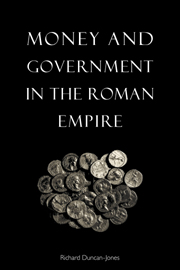Book contents
4 - Tax and tax-cycles
Published online by Cambridge University Press: 08 October 2009
Summary
THE CASE OF EGYPT
INTRODUCTION
Egypt provides our one practical example of how Rome taxed her provinces. The source is stray documentary survivals, which are cumulatively impressive, although they are concentrated in particular districts. The tax-system is apparently thorough and minute, with farm land surveyed and taxed almost to the last square foot. The tax assessments take into account irrigation status and to a lesser extent poor harvests. But tax-yield declines substantially over the long term, suggesting that the land was being taxed too heavily or over-exploited.
Hyginus shows tax-rates of one-seventh and one-fifth in different provinces, and rates as low as one-tenth are also known. But only Egypt provides enough evidence to show in detail how provincial taxation worked under the Empire. The position here was complicated by Egypt's unique dependence on the Nile flood. Nevertheless, Egypt remains the one province where extensive tax-details have survived, and since it was one of the most important provinces, the government's handling of this resource should provide some index of its financial policies as a whole.
THE AVERAGE TAX-RATE FOR GRAIN LAND
A primary aim of this discussion is to assess the scale of tax-revenue and how this changed. But that means some investigation of how taxes worked and how they were applied. Whether land was public or private made an enormous difference to how much tax it paid.
- Type
- Chapter
- Information
- Money and Government in the Roman Empire , pp. 47 - 64Publisher: Cambridge University PressPrint publication year: 1994

